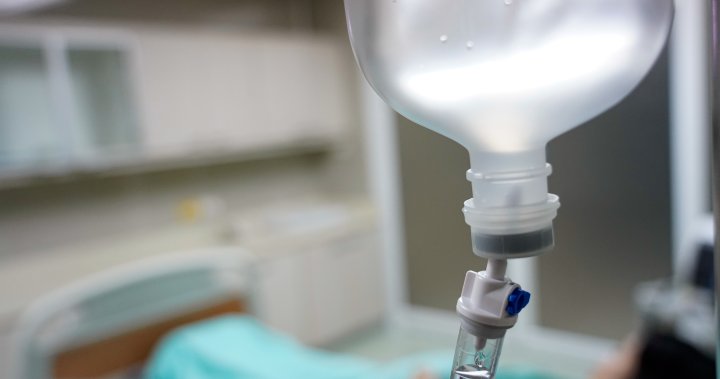Hurricane Helene triggers IV fluid shortage in U.S. Is Canada next? – National

Hospitals across the United States are scrambling to manage a shortage of IV fluids after Hurricane Helene forced the shutdown of a key facility that produces most of the nation’s supply. The facility also supplies IV fluid to Canadian hospitals.
Baxter International Inc., a medical technology company that supplies 60 per cent of the U.S. stock of intravenous (IV) drips and peritoneal dialysis solutions to hospitals, was forced to shut down at the end of September after Hurricane Helene devastated the southeastern U.S. coast.
The medical company also supplies IV fluids to Canada but so far there have been no reported shortages. There is one Baxter manufacturing facility in Ontario.
A spokesperson from Nova Scotia Health told Global News Wednesday that, although its hospitals receive IV fluid supplies from Baxter, they have not yet experienced any shortages.
“Baxter has not notified us of any issues related to their products, and there has been no impact on IV supplies in Nova Scotia Health facilities,” the spokesperson said in an email.
Global News asked Baxter International whether supplies from its Canadian facility could be diverted to the U.S. A spokesperson provided a link to a company statement and did not directly address that specific question.
Global News has also reached out to Health Canada on the matter but has not yet received a response.
IV fluids are liquids administered directly into a vein through an intravenous drip or injection. They help maintain or restore a patient’s fluid balance, deliver medications and provide essential nutrients.
The shortage happened after Hurricane Helene made landfall in Florida on Sept. 26 and travelled along the southeastern U.S. unleashing powerful winds and deadly floods that created a path of destruction stretching over 500 miles from Florida to the southern Appalachians.

The storm ripped up roads and destroyed homes, leaving hundreds unaccounted for and many confirmed dead. On Sept. 29, Baxter announced that its North Cove facility in North Carolina had been flooded, forcing it to halt production.
“The impacts of Hurricane Helene have led to the temporary supply disruption at the Baxter facility in Marion, North Carolina,” the U.S. Department of Health and Human Services (HHS) said in a Wednesday media release.

Get weekly health news
Receive the latest medical news and health information delivered to you every Sunday.
“The Baxter facility provides a significant portion of IV solutions, irrigation fluids, and peritoneal solutions to the U.S. medical system. There are currently shortages of normal saline IV fluids, normal saline irrigation fluid, sterile water irrigation, and dextrose five per cent IV fluids that pre-date Hurricane Helene. The hurricane-related supply disruption at the Baxter facility will likely lead to further constraints for IV fluids.”
The U.S. health agency said Hurricane Milton, expected to make landfall in Florida Wednesday, could also disrupt the IV fluid supply chain.
On Wednesday, Baxter provided an update on its facility, outlining steps to manage inventory and minimize disruptions to patient care. This includes limiting stockpiling, with allocations for children’s hospitals being raised to 100 per cent, the company added.
Baxter said it was also increasing the U.S. allocation of its IV fluids for direct customers to 60 per cent from 40 per cent and for distributors to 60 per cent from 10 per cent, effective Wednesday.
“Our goal continues to be to restore customers to 100 per cent allocation levels as soon as possible. This would be achieved through a combination of importing product from other Baxter facilities and the resumption of operations and scale-up of production at our North Cove facility,” the company stated.

Using Gatorade instead of IV fluid
Dr. Paul Biddinger, an emergency physician at Mass General Brigham in Boston, stated during a media conference last week that the hospital is receiving only about 40 per cent of its usual IV fluid supply from Baxter.
Mass General Brigham, which includes 12 hospitals, is giving some patients water or Gatorade instead of starting an IV, Biddinger said. He added that anyone who needs an IV can still get one, and the system’s clinical services are operating normally.
“It’s too early to say what will happen if this continues for many weeks or months, but we have systems and plans in place so we can deal with that,” he said.
The American Hospital Association (AHA) on Monday released a statement saying it is deeply concerned about the closure of the plant due to hurricane damage. The association also expressed concern after Baxter and other IV solution suppliers implemented strict ordering allocations for their customers and stopped accepting new clients.
“As a result, our members are already reporting substantial shortages of these lifesaving and life-supporting products,” it stated. “Patients across America are already feeling this impact, which will only deepen in the coming days and weeks unless much more is done to alleviate the situation and minimize the impact on patient care.”

In response to the shortage, the AMA urged the U.S. government to take immediate action to increase the supply of IV solutions for hospitals and has called for a national emergency to be declared under the National Emergencies Act.
Virginia-based UVA Health University Medical Center said it was postponing some elective surgeries for the upcoming days because of the IV fluid shortage. It added that full restoration “may take several weeks.”
Los Angeles-based Cedars-Sinai Medical Center told Reuters in a statement that as a result of the interruption, “to actively conserve IV fluids, we have implemented contingency plans and are reviewing our IV needs” as they look for other ways to source IV fluids.
— with files from The Associated Press and Reuters
© 2024 Global News, a division of Corus Entertainment Inc.








